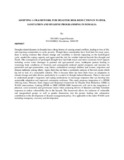ADOPTING A FRAMEWORK FOR DISASTER RISK REDUCTION IN WATER, SANITATION AND HYGIENE PROGRAMMING IN SOMALIA
Abstract
Drought related disasters in Somalia have a long history of causing armed conflicts, leading to loss of life,
and exposing communities to cyclic poverty. Though these communities have lived here for many years,
there is strong evidence that climate change and variability is directly impacting on the hydrological
cycle, eroded the coping capacity and aggravated the risk for weather induced hazards like drought and
floods. The consequences of prolonged drought have had both macro and micro economic level impacts
including severe water shortages in pastoral and agro-pastoral areas, inadequate pasture leading to
worsening body conditions of livestock and consequently reduced market prospects and incomes for
pastoralist and agro-pastoralists, crop failure, malnutrition amongst children and women, migration and
disease outbreaks among others. Again, there has not been a systematic analysis of the root causes which
has led to lack of a sustainable solution.

